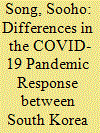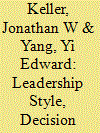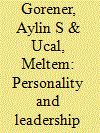|
|
|
Sort Order |
|
|
|
Items / Page
|
|
|
|
|
|
|
| Srl | Item |
| 1 |
ID:
189471


|
|
|
|
|
| Summary/Abstract |
The impact of the COVID-19 pandemic has varied across countries. Some countries controlled the virus relatively well, while others did not. In the United States, almost a million people died. However, South Korea’s death toll is only about 12,000 even though its population is about one-sixth of the United States. What caused the difference? We argue that public compliance to government direction is the primary reason. South Korea’s collective culture valuing communal benefits helped the people conform to government directions, such as mask wearing in public places. By contrast, American people resisted the government policies that restrict individual freedom due to the individualistic culture. In South Korea, historical experiences of relatively frequent national crises led to the rise of defensive nationalism, resulting in national union. However, the United States had relatively fewer national crises, and thus nationalism did not rise. Instead, national division, xenophobia, and hatred toward Asians prevailed in the United States. Besides the cultural differences, differences in national leader’s characteristics, past experiences of public health crisis, and political system also contributed to the different outcomes of the crisis.
|
|
|
|
|
|
|
|
|
|
|
|
|
|
|
|
| 2 |
ID:
083749


|
|
|
|
|
| Publication |
2008.
|
| Summary/Abstract |
The poliheuristic (PH) theory of decision making has made important contributions to our understanding of political decision making but remains silent about certain key aspects of the decision process. Specifically, PH theory contends that leaders screen out politically unacceptable options, but it provides no guidance on (1) the crucial threshold at which leaders reject options as politically unacceptable, (2) whether this threshold varies across leaders and situations, and, (3) if so, which factors shape variation in this threshold. We integrate PH theory with research on political leadership and decision context and derive hypotheses from this modified PH framework. An experimental test reveals that situational context and leadership style affect both (1) the ``noncompensatory threshold'' at which decision makers reject options as politically unacceptable and (2) how much decision makers rely on their constituents' views in making policy choices. We conclude that a modified PH theory incorporating these insights will have enhanced explanatory and predictive power.
|
|
|
|
|
|
|
|
|
|
|
|
|
|
|
|
| 3 |
ID:
108459


|
|
|
|
|
| Publication |
2011.
|
| Summary/Abstract |
Recep Tayyip Erdog(an is clearly the most controversial figure in recent Turkish political history. His preponderance in political life is remarkable even by Turkish standards. Because Erdog(an is so powerful and has effectively weakened most internal checks on his power, any attempt to explain Turkey's recent foreign policy outcomes will be seriously lacking without considering his leadership impact. The purpose of this study is to investigate Erdog(an's worldview and leadership style, and evaluate their impact on his government's policy processes and outputs. To do that, we employ the Leadership Trait Analysis technique to construct the leadership profile of Erdog(an through content analysis of his verbal records while in office. We contend here that our understanding of AKP-era Turkey is enhanced if we offer a systematic and rigorous account of Erdog(an's personality, and that he presents a clear example of the importance of taking individual-level variables seriously in foreign policy analysis.
|
|
|
|
|
|
|
|
|
|
|
|
|
|
|
|
|
|
|
|
|